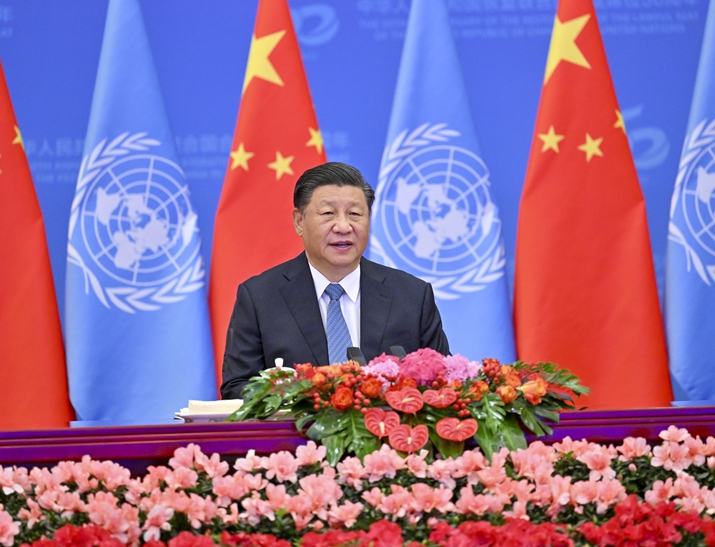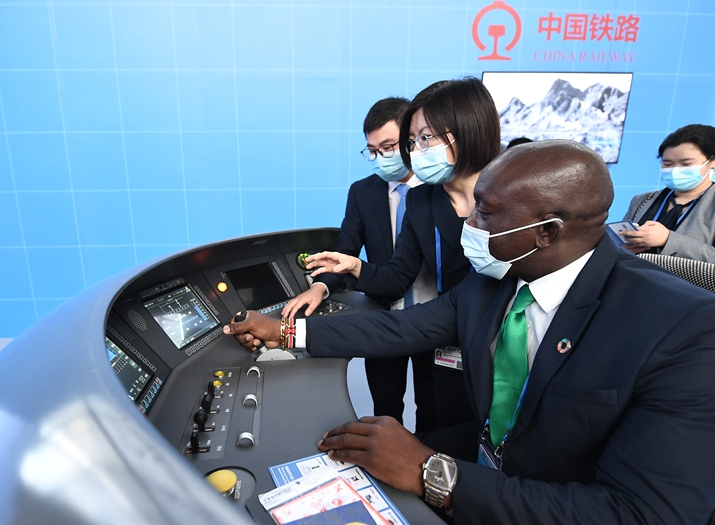| China |
| In line with its historic UN contributions, China is set to do more | |
|
|
 President Xi Jinping addresses a commemorative meeting marking the 50th anniversary of the restoration of the People's Republic of China's lawful seat in the UN in Beijing on October 25 (XINHUA)
Five decades may have gone by, but Ye Zhixiong, now in his 90s, can still clearly recall the warm welcome the Chinese delegation received inside the UN Assembly Hall on November 15, 1971. Ye, a Xinhua News Agency reporter at the time, was dispatched there to witness the debut of the delegation of the People's Republic of China (PRC) at the UN. Some 20 days earlier, the UN General Assembly adopted Resolution 2758 to restore the PRC's lawful seat. Some countries had arranged to give welcome speeches on behalf of various regions of the world, but many international representatives spoke impromptu, Ye recalled. What impressed him most were the moments when the Hungarian representative made his speech in standard Chinese and the representative of Chile quoted several poems by Chairman Mao Zedong. After the head of the Chinese delegation, then Vice Foreign Minister Qiao Guanhua, had finished his address, the representatives of more than 30 countries lined up, waiting to shake hands and express their congratulations. According to Ye's records, the meeting ran far past the allotted time. China is a founding member of the UN, and the PRC has been the sole legitimate representative of China since 1949. But the PRC was kept out of the international organization mainly due to the hostility of and obstruction by the United States. For 22 years, its seat was illegally taken by representatives of the Kuomintang authorities in Taiwan. "I was in my 40s back then; today, I am 90-plus," Ye told Xinhua. In his eyes, the past 50 years have witnessed the nation's increasing contributions to the UN in peace and development.  Then Vice Foreign Minister of China Qiao Guanhua (left) and other Chinese delegates enjoy their new seats at the UN on November 15, 1971 (VISUAL PEOPLE)
Building bridges The five decades since the PRC restored its lawful seat in the UN have witnessed China's peaceful development and its commitment and dedication to the welfare of all humanity, Chinese President Xi Jinping said at the conference marking the 50th anniversary of the return of the PRC to the UN on October 25. The PRC has always been a strong supporter of other developing countries and has strived for the common development of all since its founding, Ning Tuanhui, an assistant research fellow with the China Institute of International Studies, told Beijing Review. The 1,860-km Tazara Railway, linking the port of Dar es Salaam in east Tanzania with New Kapiri Mposhi in Zambia, is a telling example of China's assistance to other developing countries. In 1964, Tanzania and Zambia became independent successively and both found themselves in dire need of economic resources to consolidate their political independence. As a main copper producer, Zambia, an inland African country, heavily relied on the export of the precious metal and required a transportation line to connect the country to the Tanzanian port. The World Bank, the Soviet Union and several large corporations at the time all, for different reasons, refused to offer assistance to the Zambian Government. When Zambia then approached China, China said yes. "At that time, China was also going through a difficult period due to its poorly performing economy, and the construction of a railway is never an easy task," Tang Wensheng, Mao's interpreter, recalled. "But we tried our best to help and finished the construction, a token of the sincere friendship between China and these countries." "We have done what we could to help other developing countries, and have offered the world new opportunities through our own development," President Xi said in his speech. In 2013, China put forward the Belt and Road Initiative, intended to enhance connectivity between different parts of the world. In support thereof, a range of institutions was established such as the Asian Infrastructure Investment Bank and the Silk Road Fund, both of which will facilitate the road ahead for countries in need of infrastructure-building capital. "The Belt and Road Initiative offers a way to gather together and promote investment and infrastructure, benefiting from the capacity, the resources, and the expertise that Chinese companies have developed over the years within China," Brazilian Ambassador to China Paulo Estivallet de Mesquita told Beijing Review. Moreover, China has endeavored to open up wider to the outside world and share the huge potential of the nation's market. In 2018, it initiated the China International Import Expo (CIIE) to offer corporations worldwide the opportunity to enter the Chinese market, demonstrating China's unrelenting support for trade liberalization and economic globalization. The Fourth CIIE is set to take place in Shanghai from November 5 to 10.  Participants in the Second UN Global Sustainable Transport Conference try out the simulated driving of a high-speed train in Beijing on October 14 (XINHUA)
Substantial support "The Chinese people have upheld the authority and sanctity of the UN and practiced multilateralism, and China's cooperation with the UN has deepened steadily," President Xi said in his speech. China's growing contributions to the UN are tangible. Since 1990, it has assigned over 50,000 peacekeepers to join UN operations, more than any other permanent member of the Security Council. The China-UN Peace and Development Fund has provided $67.7 million for 80 projects related to peacekeeping since President Xi first announced the fund in 2015. It is now the second largest financial contributor to both the UN and UN peacekeeping operations. What's even more crucial is that China has always stayed true to the purposes and principles of the UN Charter and upheld the central role of the UN in international affairs. Some countries have bypassed the UN in the pursuit of unilateralism. One example is that of the U.S. making a dramatic exit from the UN Educational, Scientific and Cultural Organization and UN Human Rights Council in October 2017 and June 2018, respectively, under President Donald Trump. The U.S., now under President Joe Biden, went on to regain its seat on the UN Human Rights Council on October 14. Yet China has always and consistently practiced multilateralism under the UN framework and extended its cooperation with the UN, Kang Xiao, an associate professor of international relations with Beijing Foreign Studies University, explained. In the top diplomat meeting between China and the U.S. in Anchorage, Alaska, in March, China once again voiced its backing for the UN-based rules and concepts. Facing U.S. Secretary of State Antony Blinken's accusation that China threatens the rules-based world order, Yang Jiechi, Director of the Office of the Foreign Affairs Commission of the Communist Party of China Central Committee, responded that what China and the international community uphold is the UN-centered international system and the international order underpinned by international law, not what is advocated by a small number of countries—the so-called rules-based international order. International rules can only be made by the UN member states, rather than by any individual countries or blocs, Ning said. And the UN rules should, without exception, be observed by all member nations, he noted. No country is an island Today, many of the UN goals need to be achieved via joint efforts. Global issues such as terrorism, climate change, cybersecurity and biosecurity can never be dealt with by a single country, according to Ning. That's why the world needs more inclusive global governance, more effective multilateral mechanisms and more active regional cooperation, he continued. For example, the comprehensive response to climate change is one of the UN's primary sustainability goals. China has already committed to peaking its carbon emissions before 2030 and achieving carbon neutrality before 2060. This will not be an easy task. China has always incorporated both the UN Millennium Development Goals and the UN 2030 Agenda for Sustainable Development into its national policies and exerts every effort to achieve these objectives, Kang added. "We need to encourage green recovery, green production and green consumption, promote a civilized and healthy lifestyle, foster harmony between man and nature, and let a sound ecology and environment be the inexhaustible source of sustainable development," President Xi said in his speech on October 25. Climate change aside, today's world remains under the shadow of the pandemic. Since the earliest trying times of the pandemic, China has been active in sharing its COVID-19 response experience with the world, and dispatched large quantities of medical supplies and vaccines to countries in need. In his speech on October 25, President Xi called on all countries to work together to overcome the impacts of COVID-19 on global development. "We count on China to take on an essential role in global health by stepping up efforts to make COVID-19 vaccines a global public good, including contributions to the COVAX facility, a necessary step toward stopping the pandemic for everyone, everywhere," UN Secretary General António Guterres said on the 50th anniversary of Resolution 2758 on October 24. COVAX is a UN-backed international initiative aimed at promoting equitable access to vaccines. In today's globalized world, no country is an island. Only through the concerted efforts of all countries, can the world walk out of the shadows of the pandemic, climate change and other pressing challenges, Ning concluded.
(Print Edition Title: FIVE DECADES AND COUNTING) Copyedited by Elsbeth van Paridon Comments to wenqing@bjreview.com |
|
||||||||||||||||||||||||||||||
|